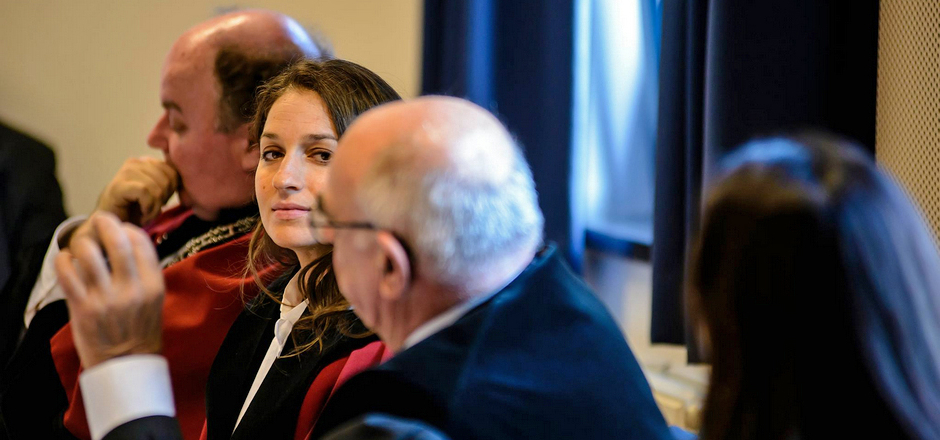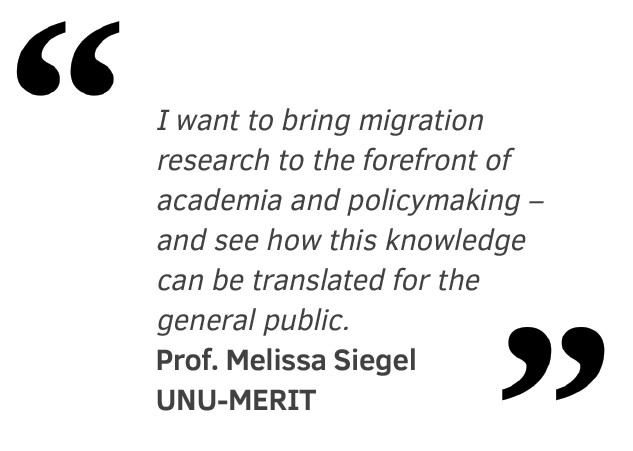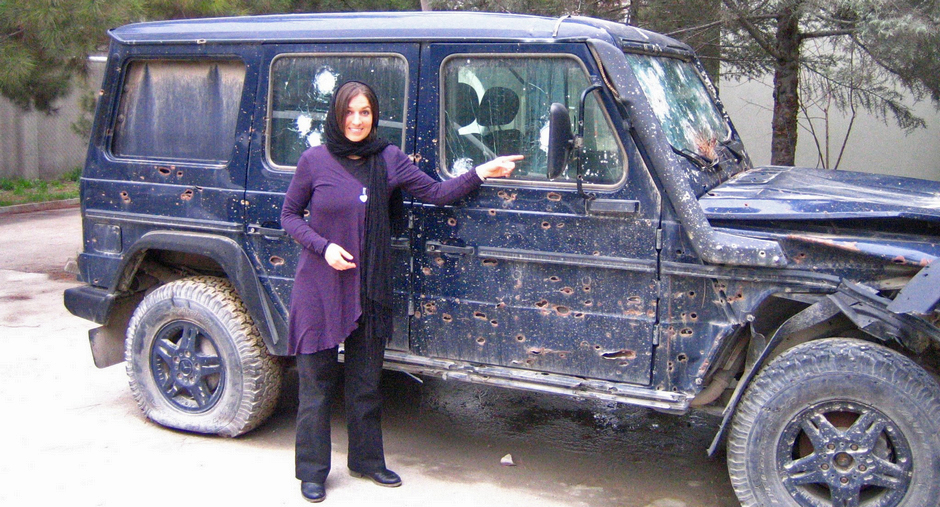Making Migration A Priority: Prof. Melissa Siegel
-
2017•06•06

Dr. Melissa Siegel, who runs the Migration and Development group at UNU-MERIT, was appointed Professor of Migration Studies at Maastricht University in August 2016. She gives her inaugural lecture on ‘Migration &: The Depth and Breadth of Migration Studies’ on 2 June 2017. Howard Hudson caught up with her to find out more
What’s the backstory to your intriguing lecture title?
It was meant to be thought-provoking. The point is to show how migration is linked to so many things in the world. People often have the misconception that migration is quite a narrow topic but I often say to people: ‘tell me what you are working on and I will tell you how it is related to migration’.
The aim of the inaugural lecture is to walk through what we consider a migrant, what are the different types of migrants, and then move on to how migration interacts with other areas. It may be that migration affects these areas or vice versa or that they have a circular relationship.
There are some issues that people don’t think are related to migration at all: like migration and health or migration and corruption. Those are the things that I will talk about that, I think, are less covered by other scholars. But I will also talk about other things that are at the forefront when we think about migration – like migration and the labour market, poverty, development, etc.
I will also talk about migration and gender, as there are so many ways these two issues are related. For example, more women are migrating alone – in their own right – because their services are required; also gender norms are being transformed in different parts of the world with some women leaving while fathers stay behind. I will then talk about how these issues, and my work, are related to policy, before mapping out my future research agenda – which will fall along many of these lines.
One of the things I am very interested in understanding is mobility. We often think how mobility affects development; so when someone moves how does that affect those left behind? How does that affect development in the host country? However, another interesting question is what happens when someone tries to be a migrant but, for one reason or another, fails? Do they give up? Do they stop being active members of the community?
How is mobility different from migration?
Mobility is a term that basically encompasses more things. For example within the Netherlands you can
 have internal migration, which we could simply call ‘more mobility’. It can be across borders or within borders – it’s just a broader concept.
have internal migration, which we could simply call ‘more mobility’. It can be across borders or within borders – it’s just a broader concept.Another topic I am interested in is migration and development, and how they are interlinked. There is a common misconception that if we develop countries people will stop migrating. First of all, morally, I would say it is wrong to even think about it like that. But, practically, we also know that as countries move from less and least developed to middle income status, then people will start to migrate more.
I want to understand at what point in development our discourse on migration changes. We know that as countries develop there is an increase in migration – until they reach a tipping point. Migration reduces once countries reach middle income status, then even more once they reach high-income and very high-income status, but certainly not back to the same levels as low-income countries.
What changes most of all is our rhetoric. When migration comes from low-income countries everyone is concerned about it and thinks about putting up barriers to entry, but as soon as we talk about migration from highly-skilled countries it’s all about the ‘global race for talent’ and ‘competing for the best and the brightest’. All of a sudden we want expats and the highly-skilled. So, it’s not that migration changes but rather our attitudes towards migration change. I would like to know where the switch happens. At what level of skills or development do we – as society – make this switch from not wanting immigrants to wanting immigrants.
What is this professorship built on? What comes next?
I came to UNU-MERIT and started the migration hub from scratch in 2010. Since then I’ve built it up over time through strong relationships with various high-level organisations. These include the Swiss Agency for Development and Cooperation (SDC), the German Agency for International Cooperation (GIZ), the International Centre for Migration Policy Development (ICMPD), and the Inter-American Development Bank (IDB).
Within the UN System we work closely with many agencies, funds and programmes. For example, UNHCR, UNICEF, and UNIDO, which recently joined the UN Global Migration Group. We also work a lot with the ILO, IOM, and UN Women (in fact several of our graduates have gone on to work for UN Women), as well as the World Bank and UNDP.
In terms of what comes next, I want to bring migration research to the forefront of academia and policymaking – and see how this knowledge can be translated for the general public. Public engagement is a big area of interest for me. I would like to make our research more relevant to a wider audience: be they academics, policymakers or civil society reps. I also want to work even more with the UNU-MERIT Communications team to make our work more accessible and digestible.
With this professorship in Migration Studies, I feel I have a long career ahead of me. For the foreseeable future I will stay in Maastricht to continue to build my career and the migration and development team at UNU-MERIT. We have made a quite a name for ourselves and we have done very important policy and research work. I plan to strengthen that even more.
